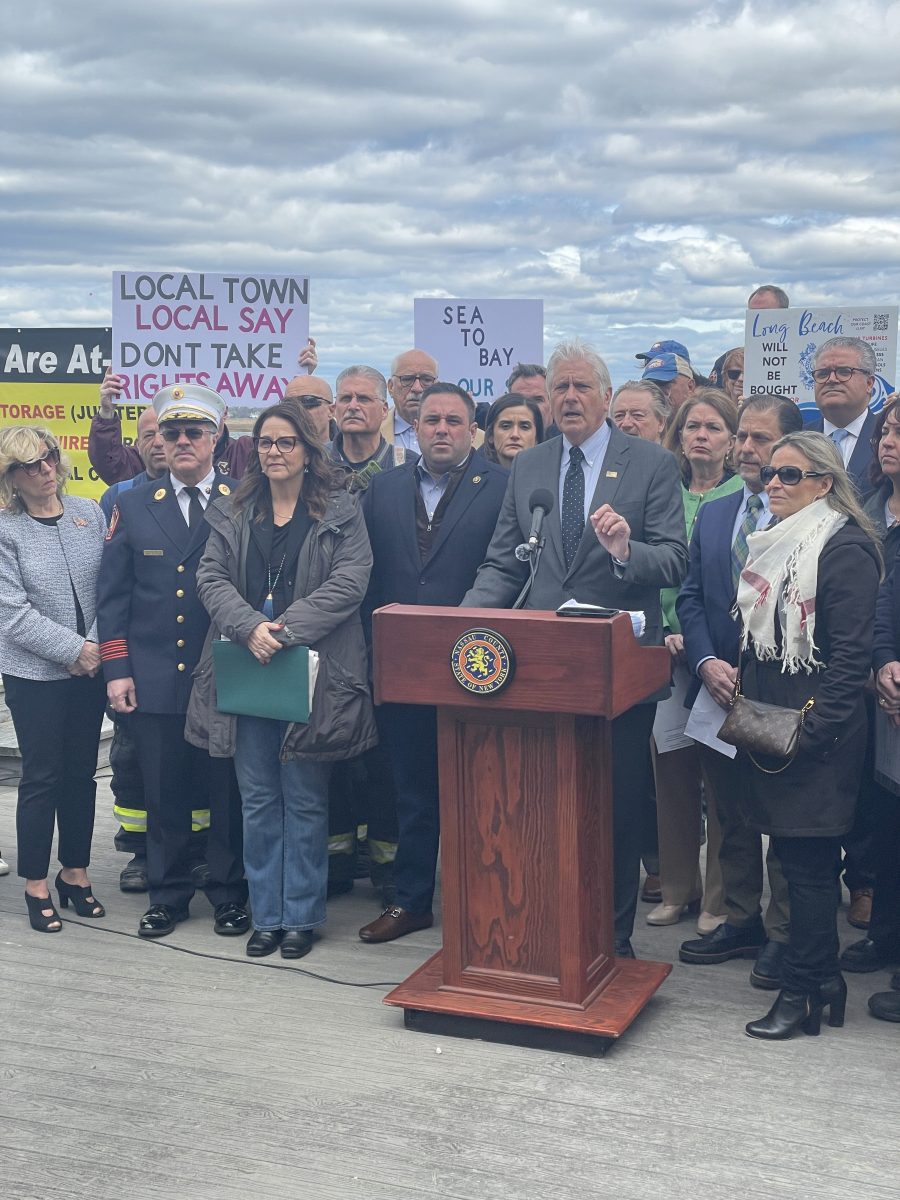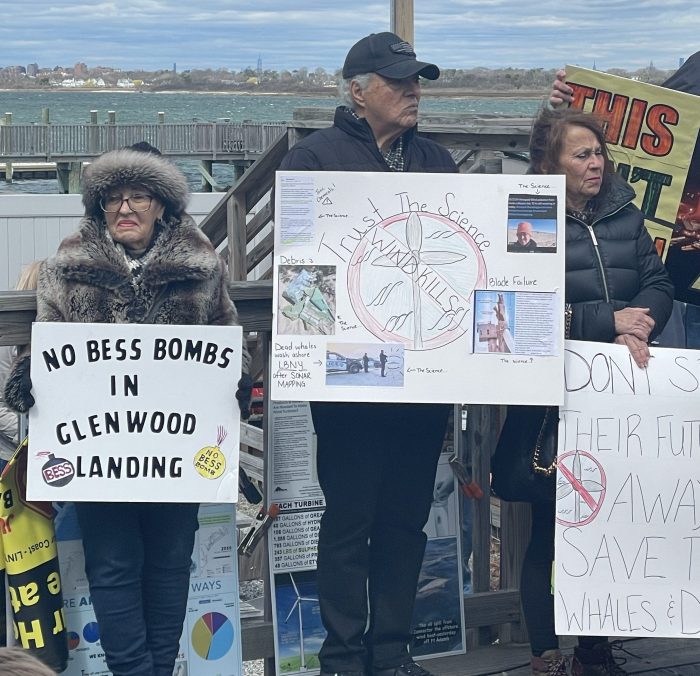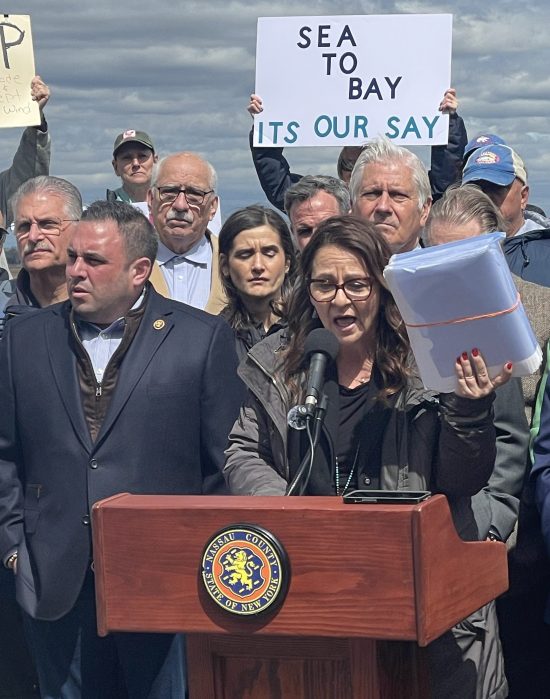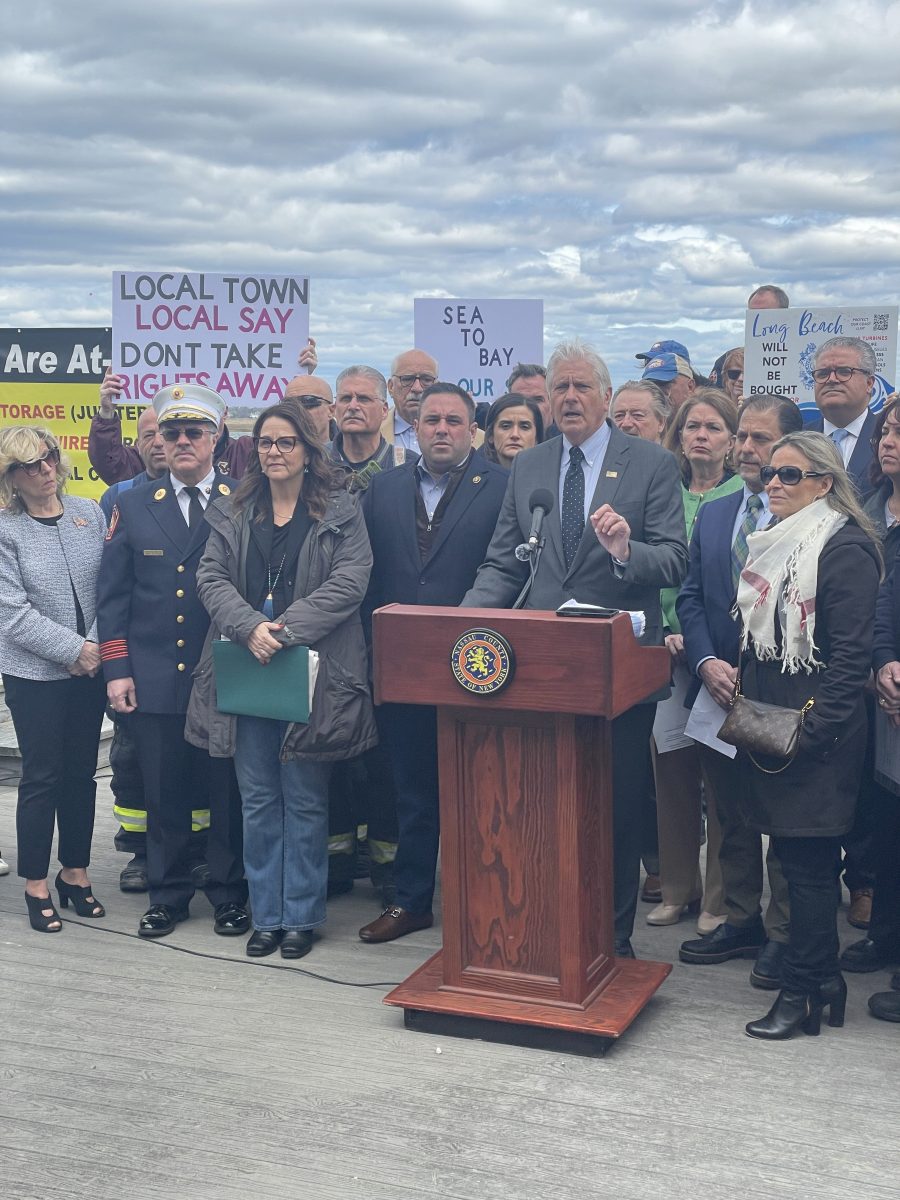
Nassau Republicans oppose wind and energy projects at the Long Beach Fire Department on Wednesday, April 16
Casey Fahrer
Nassau County Republicans called out proposed wind and energy projects in what they said was an effort to increase local control at an event held at the Long Beach Fire Department on Wednesday, April 16.
County Executive Bruce Blakeman, who led the gathering, took aim at the Democratic-controlled state Legislature.
“Our elected officials in Albany are not listening to us,” Blakeman said.
Blakeman began the press conference by opposing ongoing wind power projects.
The development company Equinor is building Empire Wind 1 as a major wind farm south of Long Island. It was announced later on Wednesday that U.S. Interior Secretary Doug Burgum ordered a stoppage to the project.
Equinor said Empire Wind 1 will be located 15-30 miles south of the region, producing 810 megawatts of renewable energy and potentially powering half a million homes. According to Equinor, the 80,000-acre project is expected to be operational in 2027. Empire Wind 2 was canceled in 2024 and would have been adjacent to the first project and more powerful.
President Donald Trump issued an executive order on his first day in office blocking or pausing all new wind energy leasing in federal waterways, but Equinor had already received the federal approvals it needed to continue with its project.
Gov. Kathy Hochul has supported the Empire 1 project and criticized the Trump administration’s authority within the state.
“As governor, I will not allow this federal overreach to stand,” Hochul said in a statement on Wednesday after the halt of the project was announced. “I will fight this every step of the way to protect union jobs, affordable energy and New York’s economic future.”
Christina Kramer, founder of Long Island’s Protect Our Coast organization, said the group is launching a federal lawsuit against the U.S. Commerce Commission and the Department of the Interior due to the environmental risks to the community.
Blakeman said he has spoken with Lee Zeldin, the head of the U.S. Environmental and Protection Agency and a Long Island native, about Empire 1. The county executive said Zeldin will investigate the project.
Former U.S. Rep. Anthony D’Esposito, who represented the 4th congressional district and now serves as the inspector general of the U.S. Labor Department, said he supports local government having a say on what happens in their area. D’Esposito had served as the co-chair for the Offshore Wind Caucus, something he said he did to show the state’s energy efforts to the rest of the country.
Other officials spoke on the proposed battery energy storage systems throughout the county.
Town of Oyster Bay Supervisor Joseph Saladino, Town of North Hempstead Supervisor Jennifer DeSena and state Assembly member Ari Brown all called the state’s initiatives a grab for land, water and money.
“When you ignore the will of the people, you begin to damage democracy and that’s the reality out of Albany,” Saladino said.
The Town of Oyster Bay extended a moratorium on battery energy storage systems until Oct. 30 last week. The Towns of Hempstead and North Hempstead also have similar moratoriums in place.
Some residents held signs on Wednesday in protest of the Jupiter Power Company’s proposed energy facility in Glenwood Landing. The 275-megawatt lithium battery storage facility would be located near the Glen Head and Glenwood Landing elementary schools and local residences.

“It’s our home, it’s our town, it’s our say, don’t take our rights away,” said Chris Panzeca, a resident who has previously spoken at multiple Town of Oyster Bay hearings about the proposed facility.
There is also a one-acre proposal for a Bethpage Battery Storage Project that would feature a 44-megawatt facility at the old Grumman site within the town.
DeSena said that the state is having Long Island “serve as a battery for New York City’s needs.”
The supervisors of the three Nassau towns previously spoke out against the RAPID Act on April 1 in Island Park.
The RAPID Act, which was enacted in April 2024, consolidated the environmental review, permitting and siting of major renewable energy facilities and major electric transmission facilities under the responsibility of one office, the Office of Renewable Energy Siting and Electric Transmission, according to the state Department of Public Service.
The state said the biggest change brought by the RAPID Act relates to the approval and permitting of “major” electric transmission facilities. These are defined as transmission lines that have a capacity of 125 kilovolts or larger and are at least one mile in length or have a capacity of 100 kilovolts or larger and are at least 10 miles in length, on the state’s website.
There is a public comment period open until April 18, which officials on Wednesday urged the public to speak up and protect their local environment.
Kramer said that her organization has over 20,000 signed petitions against the RAPID Act, as she held up a large folder bound together with a rubber band.

The Moss Landing Energy Storage Facility fire in California in January caused an evacuation, extensive damage to the facility and environmental concerns. Officials on Wednesday said fires at these facilities are difficult to extinguish.
“There are a lot of benefits to the different technologies, but the issue that we’re more concerned about is firefighter safety,” Nassau County Fire Coordinator Michael Uttaro said.

